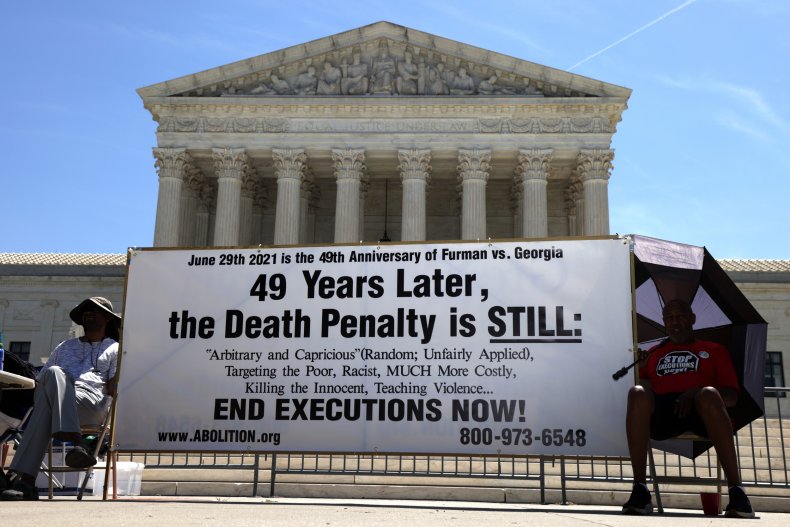States Banded From Continueing Death Penalty Ststesbannded From Death Penalty
Death sentences and executions fell to near record lows in 2021, but "extreme conduct" by some states is preventing the end of capital punishment in the U.S., according to a new report.
The death penalty in 2021 was "defined by two competing forces: the continuing long-term erosion of capital punishment across most of the country, and extreme conduct by a dwindling number of outlier jurisdictions to continue to pursue death sentences and executions," according to the Death Penalty Information Center's (DPIC) year-end report.
The report says few jurisdictions performed or even scheduled executions in 2021, but those that did "undertook extreme measures that demonstrated a lack of concern for due process and a cavalier inattentiveness to execution preparation."
Among them was Oklahoma, which set seven execution dates despite a pending trial on the constitutionality of the state's lethal injection protocol, and South Carolina, which attempted to schedule executions without obtaining execution drugs or establishing a protocol for executions by firing squad, according to the report.
The report pointed to Virginia becoming the first Southern state to abolish the death penalty in March as a sign of the continuing decline of capital punishment in the U.S. Twenty-two other states have abolished the death penalty, three have formal moratoriums on its use and another 10 states have not carried out an execution in at least a decade, according to the report.
The DPIC's report said 18 people have been sentenced to death in 2021 as of Monday, matching 2020's number for the fewest since the beginning of the modern era of the death penalty in 1972.

And the 11 executions carried out in 2021 were the fewest since 1988, according to the report, down from the 17 that took place last year.
This year was also the seventh year in row where there were fewer than 50 new death sentences and 30 executions, the report said.
The year's first three executions were carried out by Donald Trump's administration—the last inmates put to death in an "aberrant" spree of federal executions that began in July 2020.
"The three prisoners executed in January—Lisa Montgomery, Corey Johnson, and Dustin Higgs—each presented case-specific reasons why their executions would be inappropriate," the report said.
President Joe Biden's administration paused federal executions, but the report says it has "set no policy on the federal death penalty, allowing the Department of Justice to make decisions on capital prosecutions and appeals on a case-by-case basis."
In May, Texas resumed executions after a pause that lasted almost a year, putting to death Quintin Jones without any media witnesses present. The state went on to execute John Hummel in June and Rick Rhoades in September.
Oklahoma executed two inmates: John Grant, who witnesses said vomited and repeatedly convulsed during his lethal injection, and Bigler Stouffer. Three other states—Alabama, Mississippi, and Missouri—each executed one inmate in 2021.
The DPIC's report also detailed how racism continued to affect the use of the death penalty in 2021. Six of the 11 people executed this year were Black, while the majority (61 percent) of people sentenced to death in 2021 were Black or Latinx.
It also pointed to three high-profile cases, all Black men who have maintained their innocence in the crimes they were condemned for, that symbolize "the enduring racial injustice of the nation's death penalty."
"Julius Jones and Pervis Payne were spared execution, only to be resentenced to life in prison," the report said. "A Texas trial judge in a county with a history of lynchings heard extensive evidence of Rodney Reed's innocence, then credited the testimony of a disgraced white police officer who was the likely killer over that of nearly a dozen other witnesses to recommend that Reed be denied a new trial."
Support for capital punishment is at the lowest it has been for almost 50 years, the report also found. An analysis of 600 public opinion surveys conducted over the course of 75 years indicate that public support for capital punishment has steadily declined since the 1990s and was lower in 2021 than at any other time since 1966.
Virginia's repeal created an area free of the death penalty from the Canadian border of Maine to the northern border of the Carolinas along the Atlantic coast, while an execution-free zone also spans the Pacific coast from Alaska to Mexico, said Robert Dunham, the executive director of the DPIC.
"The handful of states that continue to push for capital punishment are outliers that often disregard due process, botch executions, and dwell in the shadows of long histories of racism and a biased criminal legal system," he said.
Ngozi Ndulue, the DPIC's deputy director, added: "We are seeing fewer and fewer executions, but those that do occur demonstrate that the death penalty is not reserved for the worst of the worst, but the most vulnerable of the vulnerable.
"The federal government began 2021 with the last three executions of the historically aberrant federal execution spree, executing people with severe mental illness, intellectual disability, and unexamined evidence of innocence. The state executions since then followed the same pattern. All but one prisoner executed this year had significant impairments such as serious mental illness; brain injury or damage; an IQ in the intellectually disabled range; or chronic serious childhood trauma, neglect and abuse."
Source: https://www.newsweek.com/death-penalty-decline-despite-extreme-conduct-report-1659225
0 Response to "States Banded From Continueing Death Penalty Ststesbannded From Death Penalty"
Post a Comment